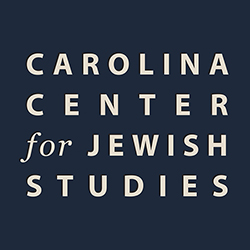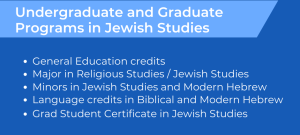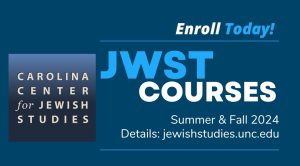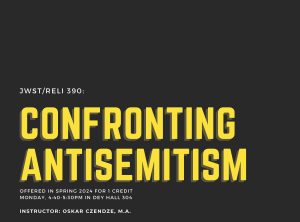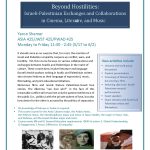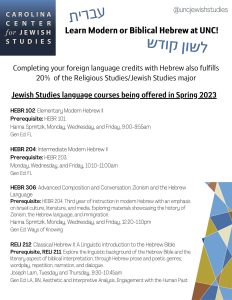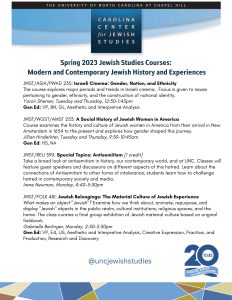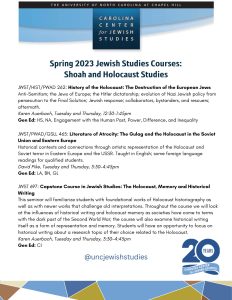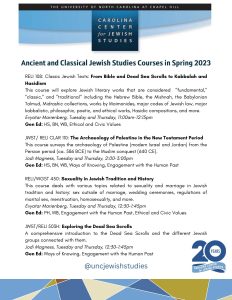Course Offerings
Updated March 21; please check back for additional courses and updated information.
Summer 2024
JWST/RELI 103: Introduction to the Hebrew Bible/Old Testament Literature. Gen Ed: IDEAs in Action — FC-KNOWING or FC-PAST; Making Connections — BN, WB. Summer Session II: Seonghyun Choi, Remote Only — Mostly Async, 6/24 – 7/30.
JWST/RELI 106: Introduction to Early Judaism. This course surveys Jewish history and religion during the Second Temple and Rabbinic periods, from the destruction of the First Jewish Temple (Solomon’s Temple) in 586 BCE to the Muslim conquest of Palestine (640 CE). Gen Ed: IDEAs in Action — FC-KNOWING or FC-PAST; Making Connections — BN, HS, WB. Summer Session I: Michelle Freeman, Remote Only – Mostly Async, 5/15 – 6/22.
JWST/HIST/PWAD 262: History of the Holocaust: The Destruction of the European Jews. Anti-Semitism; the Jews of Europe; the Hitler dictatorship; evolution of Nazi Jewish policy from persecution to the Final Solution; Jewish response; collaborators, bystanders, and rescuers; aftermath. Gen Ed: IDEAs in Action — FC-PAST or FC-POWER; Making Connections — HS, NA. Summer Session I: Karen Auerbach, M/T/W/Th/F, 1:15-4:30pm, Dey 0202, 5/15 – 5/31. Summer Session II: Oskar Czendze, M/T/W/Th/F, 9:45-11:15pm, Remote Only — Synchronous, 6/24 – 7/30.
JWST/ASIA/PWAD 462: The Arab-Jews: Culture, Community, and Coexistence. This course is designed to examine Jewish life in Arab lands in the last century by examining culture, language, and the communal life that the Arab-Jews shared with their neighbors. Gen Ed: IDEAs in Action — FC-GLOBAL or FC-POWER; Making Connections — BN, GL. Summer Session I: Yaron Shemer, M/T/W/Th/F, 11:30- 2:45pm, Rm. TBA, 5/15 – 5/31.
Fall 2024
ROML 70: First Year Seminar: Jewish Spain: History and Culture Across the Hispanic World. This seminar explores the history and culture of Jews in the Golden Age of medieval Spain, as well as how modern Hispanic cultures have interpreted and reimagined this historical past. We will explore how this fascination with Hispanic Jews overlaps with a variety of topics such as national identity, anti-Semitism, liberal democracy, colonialism, exile, and Holocaust memory, among others. Adam Cohn, T/Th 9:30-10:45, Room TBA. Gen Ed: IDEAs in Action — FY-SEMINAR, FC-AESTH.
JWST 100/RELI 123: Introduction to Jewish Studies An introduction to the broad scope of Jewish history, culture, and identity, from biblical times to the 21st century and from the Middle East to the New World. Andrea Cooper, T/Th 2:00-3:15pm, Global Center 1005. Gen Ed: IDEAs in Action — FC-PAST or FC-VALUES; Making Connections — GL, HS.
JWST/RELI 103: Introduction to the Hebrew Bible/Old Testament Literature. This course introduces students to the various books of the Hebrew Bible and to the history and culture of ancient Israel, focusing on the formation of national identity, ancient conceptualizations of divinity, ritual practice, and modes of social regulation, all of which are set against the background of the ancient Near East. Recitation Required. David Lambert, M/W 9:05-9:55am, Chapman 0201. Gen Ed: IDEAs in Action — FC-KNOWING or FC-PAST; Making Connections — BN, WB.
JWST/RELI 106: Introduction to Early Judaism. This course surveys Jewish history and religion during the Second Temple and Rabbinic periods, from the destruction of the First Jewish Temple (Solomon’s Temple) in 586 BCE to the Muslim conquest of Palestine (640 CE). Jodi Magness, T/Th 12:30-1:45pm, Caldwell 0105. Gen Ed: IDEAs in Action — FC-KNOWING or FC-PAST; Making Connections — BN, HS, WB.
JWST/AMST 251 : Jewish American Experience. 3 credits. In this course, we’ll examine the Jewish American experience from colonial times to the present through a diversity of kinships, communal settings, political commitments, and religious and cultural modes. Emily Katz, Tuesday and Thursday, 12:30-1:45pm, Dey 0203. Gen Ed: IDEAs in Action — TBA. PAST; Making Connections — TBA.
JWST/HIST 262: Holocaust. Anti-Semitism; the Jews of Europe; the Hitler dictatorship; evolution of Nazi Jewish policy from persecution to the Final Solution; Jewish response; collaborators, bystanders, and rescuers; aftermath. Karen Auerbach, T/Th 11:00-12:15, Genome Science 1373. Gen Ed: IDEAs in Action — FC-POWER or FC-PAST; Making Connections — NA, HS.
JWST/FOLK 481: Jewish Belonging/s: The Material Culture of Jewish Experience. What makes an object “Jewish”? This seminar examines how we think about, animate, repurpose, and display “Jewish” objects in the public realm, cultural institutions, religious spaces, and the home. We consider how makers and users negotiate objects’ various meanings within the domains of prayer, performance, entertainment, and exhibition. The class curates a final group exhibition of Jewish material culture based on original fieldwork. Gabrielle Berlinger, T/Th 12:30-1:45pm, Mitchell 0009. Gen Ed: IDEAs in Action — RESEARCH, FC-AESTH or FC-CREATE; Making Connections — E4, US, VP.
JWST/RELI/WGST 533: Women, Gender, and Judaism. This course examines historical developments in the study of women and gender in Judaism. We will discuss efforts to challenge and revitalize Jewish tradition through the lens of gender theory and other critical interpretive approaches. Topics to be addressed include biblical interpretation, Jewish law, feminist Jewish theology and liturgy, the renewal of ritual, the rabbinic ordination of women, gender identity, race, sexuality, queer, trans, and non-binary approaches, and representations of these themes in various media. Andrea Cooper, T/Th 9:30-10:45am, Greenlaw 0301. Gen Ed: IDEAs in Action — RESEARCH, FC-KNOWING or FC-POWER; Making Connections — CI, HS.
GSLL 51: Stalin and Hitler. Critical issues that dominated the 20th century: WWI and Bolshevik Revolution; rise of fascism, Lenin, Stalin, Hitler and their roles; origins and evolution of Cold War; collapse of Eastern Bloc. David Pike. T/Th, 2:00-3:15, Dey 0402. Gen Ed: IDEAs in Action — Seminar; Making Connections — GL, HS.
IDST 129/129L: Countering Hate. Many of our cultural endeavors are aimed at overcoming the fears, suspicions, and misunderstandings that manifest as racism, misogyny, antisemitism, Islamophobia, homophobia, etc. In this class, we examine the cognitive and political roots of hatred as well as cultural efforts to overcome it through performance, literature, film, photography, and faith. We ask: How have artists and faith leaders addressed such animosity, and how can our practices of reading, viewing, listening, and scholarship counter hate? Ariel/Gordon/Taj, T/Th, 3:30-4:45, Hamilton 0100. Gen Ed: IDEAs in Action —Triple;
HIST 81: FYS Memoirs of the Holocaust. In ghettos and hiding places during the Holocaust, European Jews and other victims of Nazism recorded their experiences in diaries and other chronicles. Students will read diaries and memoirs as well as listen to testimonies to understand Holocaust history through life narratives, exploring tensions between history and memory.Karen Auerbach. T/Th 2:00-3:15, Genome Science 1373. Gen Ed: IDEAs in Action — Seminar; Making Connections — NA, HS.
Language Courses
JWST/RELI 211: Classical Hebrew I: A Linguistic Introduction to the Hebrew Bible. An introduction to the culture and history of ancient Israel through an exploration of the language of the Hebrew Bible. Students will learn the essentials for basic engagement with biblical Hebrew, then consider what this linguistic evidence reveals about the historical and cultural background of the Hebrew Bible. Joseph Lam, M/W/F 10:10-11:00am, Mitchell 0205. Gen Ed: IDEAs in Action — FC-KNOWING or FC-PAST; Making Connections — BN, WB.
HEBR 101: Elementary Modern Hebrew I. Introduces the essential elements of modern Hebrew structure and vocabulary and aspects of modern Israeli culture. Aural comprehension, reading, speaking, and writing are stressed.Hanna Sprintzik, 2 Sessions Offered. 001: M/W/F 9:05-9:55am, Global Center 3033. 002: M/W/F 12:20-1:10pm, Hanes Art Center, 0118.Gen Ed: Making Connections — FL. Global Language: Level 1.
HEBR 203: Intermediate Modern Hebrew I. Second-year instruction in the essential elements of modern Hebrew structure and vocabulary and aspects of modern Israeli culture. Aural comprehension, reading, speaking, and writing are stressed. An introduction to representative literary works is included. Prerequisite: HEBR 102. Hanna Sprintzik, M/W/F 10:10-11:00am, Global Center 3033. Gen Ed: Making Connections — FL. Global Language: Level 3.
Spring 2024 JWST Course List
JWST/CLAR/RELI 110: The Archeology of Palestine in the New Testament Period. 3 credits. This course surveys the archaeology of Palestine (modern Israel and Jordan) from the Persian period (ca. 586 BCE) to the Muslim conquest (640 CE). Jodi Magness, Tuesday and Thursday, 3:30-4:45pm, Wilson 0107. Gen Ed: IDEAs in Action — FC-KNOWING or FC-PAST; Making Connections — HS, BN, WB.
JWST/RELI 224: Modern Jewish Thought. 3 credits. This course examines how contemporary thinkers have considered philosophy, ethics, and theology from a Jewish perspective. Methodological points of inquiry include: the role of interpretation in Judaism, revelation and redemption, authority and tradition, pluralism and inclusion, suffering and evil, gender and Jewish philosophy, and 20th-century approaches to God. Honors version available. Andrea Cooper, Tuesday and Thursday, 2:00-3:15pm, Murphey 0302. Gen Ed: IDEAs in Action — FC-POWER or FC-VALUES; Making Connections — PH, GL.
JWST/GSLL 225: Popular and Pious: Early Modern Jewish Literature. 3 credits. This seminar covers popular and pious literature written by and for Jews in the 15th to 18th century in German-speaking countries. Originally written in Old Yiddish, this literature preserved the popular European genres and nonfiction accounts of Jewish community and family life. Previously offered as GERM 225. Ruth von Bernuth, Tuesday and Thursday, 12:30-1:45pm, Dey 0410. Gen Ed: IDEAs in Action — FC-PAST or FC-VALUES; Making Connections — LA, NA, WB.
JWST/AMST 251 : Jewish American Experience. 3 credits. In this course, we’ll examine the Jewish American experience from colonial times to the present through a diversity of kinships, communal settings, political commitments, and religious and cultural modes. Emily Katz, Tuesday and Thursday, 2:00-3:15pm. Gen Ed: IDEAs in Action — TBA. PAST; Making Connections — TBA.
JWST/AMST/WGST 253: A Social History of Jewish Women in America. 3 credits. This course examines the history and culture of Jewish women in America from their arrival in New Amsterdam in 1654 to the present and explores how gender shaped this journey. Jillian Hinderliter, Tuesday and Thursday, 9:30-10:45am, Dey 0203. Gen Ed: IDEAs in Action — FC-PAST or FC-POWER; Making Connections — HS, NA, US.
JWST/HIST/PWAD 262: History of the Holocaust: The Destruction of the European Jews. 3 credits. Anti-Semitism; the Jews of Europe; the Hitler dictatorship; evolution of Nazi Jewish policy from persecution to the Final Solution; Jewish response; collaborators, bystanders, and rescuers; aftermath. Recitation required. Karen Auerbach, Tuesday and Thursday, 11:00-12:15pm, Davie 0112. Gen Ed: IDEAs in Action — FC-PAST or FC-POWER; Making Connections — HS, NA.
JWST/GSLL 274: Representing the Holocaust: Mediating Trauma in Art and Theory. 3 credits. This course will explore artistic mediations of the Holocaust in literature, film, and beyond. It focuses on questions of representation, authenticity, appropriateness and uniqueness, the role of memory, the problems and limits of language in articulating the Shoah, and issues of trauma and justice. Readings and class discussions in English. Adi Nester, Tuesday and Thursday, 2:00-3:15pm, Dey 0404. Gen Ed: IDEAs in Action — FC-AESTH or FC-PAST.
HIST 308: The Renaissance and the Jews (JWST 308) 3 credits. The Renaissance (1300–1600) is known as a time of great artistic, scientific, and political renewal. But did Jews, the only religious minority in Europe, get an opportunity to benefit from and participate in that progress? This class studies the history of the Jews at a time of great cultural change. Jennifer Grayson. Tuesday and Thursday, 12:30-1:45pm, Kenan. Gen Ed: IDEAs in Action — TBA; Making Connections — HS, WB.
JWST/RELI 343: Religion in Modern Israel. 3 credits. The relation between religious communities, their hopes and their agendas to the culture, politics, and law of the country has been a central feature of the Israeli state from its inception. Religious faiths, agendas, and affiliations have affected the character of the country, as well as its relationships with groups and governments around the globe. Yaakov Ariel, Tuesday and Thursday, 2:00-3:15pm, Murphey 0204. Gen Ed: IDEAs in Action — FC-POWER; Making Connections — SS, BN.
JWST 390: Special Topics in Jewish Studies: Confronting Antisemitism. 1 credit. JWST 390-001 is connected with the Carolina Away program. This course takes a broad look at antisemitism in history, our contemporary world, and at UNC. Class sessions will feature guest speakers and discussions on different aspects of this persistent form of hatred. The class offers a unique opportunity to explore the humanities and social sciences, meeting with faculty from English, History, Religious Studies, Psychology, German Studies and other fields. Students will hear firsthand testimony about individual experiences with antisemitism in Europe and the American South. Learning about the interconnections among Antisemitism and other forms of intolerance, students also learn how to challenge hatred in contemporary society and media. Oskar Czendze, Monday, 4:40-5:30pm, Dey 0304.
JWST/GSLL/PWAD 465: Literature of Atrocity: The Gulag and the Holocaust in the Soviet Union and Eastern Europe. 3 credits. Historical contexts and connections through artistic representation of the Holocaust and Soviet terror in Eastern Europe and the USSR. Taught in English; some foreign language readings for qualified students. David Pike, Tuesday and Thursday, 3:30-4:45pm, Global Center 1005. Gen Ed: Making Connections — LA, BN, GL.
JWST/HIST 485: From Fiddler on the Roof to the Holocaust: East European and Soviet Jewish History. 3 credits. Eastern Europe was one of the largest centers of Jewish civilization from premodern times to the Second World War, giving rise to important religious, cultural, and political developments in Jewish modernity. This course examines main developments of Jewish society from the late 18th century until the aftermath of the Holocaust. Karen Auerbach, Tuesday and Thursday, 2:00-3:15pm, Greenlaw 0302. Gen Ed: Making Connections — HS, BN.
JWST/AMST 486 : Jewish South. 3 credits. This course explores ethnicity in the South and focuses on the history and culture of Jewish Southerners from their arrival in the Carolinas in the 17th century to the present day. Marcie Cohen Ferris, Monday and Wednesday, 3:35-4:50, Alumni 0205. Gen Ed: IDEAs in Action — FC-POWER or FC-PAST; Making Connections — VHS, CI, US.
JWST/CLAR/RELI 512: Ancient Synagogues. 3 credits. This is a course on ancient synagogues in Palestine and the Diaspora from the Second Temple period to the seventh century CE. Jodi Magness, Tuesday and Thursday, 2:00-3:15, Murphey 0105. Gen Ed: IDEAs in Action — FC-KNOWING or FC-PAST; Making Connections — VP, BN, WB.
RELI 108. Classic Jewish Texts: From Bible and Dead Sea Scrolls to Kabbalah and Hassidism. 3 Credits. This course will explore Jewish literary works that are considered “fundamental,” “classic,” “traditional” (often, all of the above), including the Hebrew Bible, the Mishnah, the Babylonian Talmud, midrashic collections, works by Maimonides, major codes of Jewish law, major kabbalistic, philosophic, poetic, and ethical works, hassidic compositions, and more. Evyatar Marienberg, Tuesday and Thursday, 11:00-12:15pm, Murphey 0105. Gen Ed: IDEAs in Action Gen Ed: FC-VALUES. Making Connections Gen Ed: HS, BN, WB.
RELI /WGST 450 Sexuality In Judaism This course deals with various topics related to sexuality and marriage in Jewish tradition and history: sex outside of marriage, wedding ceremonies, regulations of marital sex, menstruation, homosexuality, and more. Evyatar Marienberg Tuesday and Thursday, 12:30-1:45pm, Murphey 0105. Gen Ed: IDEAs in Action FC-PAST or FC-VALUES. Making Connections: PH, WB.
SPAN 834: Seminar in Peninsular Spanish Literature and Culture- “Jews and the Spanish State, 19th-21st Centuries” This seminar explores how Sephardic and Jewish topics have evolved as a means of discussing questions of statehood and national identity in Spain from the mid-19th century to the present. We will study how non-Jewish intellectuals imagined the Sephardic experience in the advancement of liberal and conservative political projects and how Spanish Jewish authors have turned to (Iberian) Jewish history in order to reflect on the place of Jews in contemporary Spain. Taught in Spanish. Adam Cohn, Tuesday, 12:30-3:00, Dey 210.
Language Courses
HEBR 102: Elementary Modern Hebrew II. 3 credits. Continued instruction in the essential elements of modern Hebrew structure and vocabulary and aspects of modern Israeli culture. Aural comprehension, reading, speaking, and writing are stressed. Prerequisite: HEBR 101. Hanna Sprintzik, Monday, Wednesday, and Friday, 9:05-9:55am, Global Center 3033. Gen Ed: Making Connections — FL. Global Language: Level 2.
HEBR 204: Intermediate Modern Hebrew II. 3 credits. Continued instruction in the essential elements of modern Hebrew structure and vocabulary and aspects of modern Israeli culture. Aural comprehension, reading, speaking, and writing are stressed. An introduction to representative literary works is included. Prerequisite: HEBR 203. Hanna Sprintzik, Monday, Wednesday, and Friday, 10:10-11:00am, Global Center 3033. Gen Ed: Making Connections — FL. Global Language: Level 4.
HEBR 305: Advanced Composition and Conversation: Immigration, Ethnicities, and Religious Traditions. 3 credits. Third year of instruction in modern Hebrew with an emphasis on Israeli culture, literature, and media. Students will immerse themselves in language communication while exploring authentic materials that showcase the experience of immigration to Israel. Prerequisite: HEBR 204. Hanna Sprintzik, Monday, Wednesday, and Friday, 12:20-1:10pm, Global Center 3033. Gen Ed: IDEAs in Action — FC-KNOWING; Making Connections — FL. Global Language: Level 5.
Fall 2023 JWST Course List
ANTH 290: Israel, Palestine, Holy Land: Tourism Imaginaries and Practices. Jackie Feldman. Tuesday and Thursday, 3:30pm.
RELI 072: First-Year Seminar: Apocalypse Now? Messianic Movements in America
This course explores the messianic idea in America as well as the messianic movements that have been active in the nation’s history and their interaction with American society and culture. Yaakov Ariel, Tuesday and Thursday, 9:30-10:45am. Gen Ed: HS- Historical Analysis, NA- North Atlantic World, IDEA – FY – First Year Seminar
HIST 081: First-Year Seminar: Diaries, Memoirs, and Testimonies of the Holocaust
In ghettos and hiding places during the Holocaust, European Jews and other victims of Nazism recorded their experiences in diaries and other chronicles. Students will read diaries and memoirs as well as listen to testimonies to understand Holocaust history through life narratives, exploring tensions between history and memory. Karen Auerbach, Tuesday and Thursday, 2:00-3:15pm. Gen Ed: HS- Historical Analysis, NA- North Atlantic World, IDEA – FY – First Year Seminar
JWST 089 FYS Jewish Spain: History and Culture Across the Hispanic World
JWST 100: Introduction to Jewish Studies (RELI 123)
An introduction to the broad scope of Jewish history, culture, and identity, from biblical times to the 21st century and from the Middle East to the New World. Andrea Cooper, Tuesday and Thursday, 2:00pm-3:15pm. Gen Ed: HS- Historical Analysis, GL- Global Issues, IDEA – Engagement with the Human Past, IDEA – Ethical and Civic Values
JWST 103: Introduction to the Hebrew Bible/Old Testament Literature (RELI 103)
This course introduces students to the various books of the Hebrew Bible and to the history and culture of ancient Israel, focusing on the formation of national identity, ancient conceptualizations of divinity, ritual practice, and modes of social regulation, all of which are set against the background of the ancient Near East. David Lambert, Monday and Wednesday, 12:20-1:10pm. Gen Ed: BN- Beyond the North Atlantic, WB – The World Before 1750, IDEA – Ways of Knowing, IDEA – Engagement with the Human Past
JWST 106: Introduction to Early Judaism (RELI 106)
This course surveys Jewish history and religion during the Second Temple and Rabbinic periods, from the destruction of the First Jewish Temple (Solomon’s Temple) in 586 BCE to the Muslim conquest of Palestine (640 CE). Jodi Magness, Monday and Wednesday, 1:25-2:15pm. Gen Ed: HS- Historical Analysis, BN- Beyond the North Atlantic, WB- The World Before 1750, IDEA – Ways of Knowing, IDEA – Engagement with the Human Past
JWST 153: From the Bible to Broadway: Jewish History to Modern Times (HIST 153)
This class surveys the history of the Jews from ancient to modern times. It focuses on the development of Jewish religion, culture identity, and politics in Jewish communities in the Western, Atlantic and Middle Eastern Worlds. It also explores the development of antisemitism and anti-Jewish violence. Oskar Czendze, Tuesday and Thursday, 12:30-1:45pm. Gen Ed: HS- Historical Analysis, WB- The World Before 1750, IDEA – Engagement with the Human Past
JWST 253: A Social History of Jewish Women in America (WGST 253, AMST 253)
Course examines the history and culture of Jewish women in America from their arrival in New Amsterdam in 1654 to the present and explores how gender shaped this journey. Jillian Hinderliter, Tuesday and Thursday, 11:00am-12:15pm. Gen Ed: HS- Historical Analysis, NA- North Atlantic World
JWST 380: Traditions in Transition: Jewish Folklore and Ethnography (FOLK 380)
This seminar examines Jewish stories, humor, ritual, custom, belief, architecture, dress, and food as forms of creative expression that have complex relationships to Jewish experience, representation, identity, memory, and tradition. What makes these forms of folklore Jewish, how do source communities interpret them, and how do ethnographers document them? Gabrielle Berlinger, Tuesday and Thursday, 9:30-10:45am. Gen Ed: VP- Visual or Performing Arts, E4- Field Work, US- U.S. Diversity, IDEA – Aesthetic and Interpretive Analysis, IDEA – Ways of Knowing, IDEA – Research and Discovery
JWST 436: Language, Exile, and Homeland in Zionist Thought and Practice (ASIA 436)
Employing Zionist and post- and anti-Zionist documents, treatises, and mostly literary and cinematic texts, this class will focus on the relations between language, Jewish-Israeli identity, and the notion of homeland. Yaron Shemer, Tuesday and Thursday, 11:00am-12:15pm. Gen Ed: BN- Beyond the North Atlantic, GL- Global Issues, IDEA – Global Understanding and Engagement, IDEA – Power, Difference, and Inequality
JWST 533: Women, Gender, and Judaism (WGST 533, RELI 533)
This course examines historical developments in the study of women and gender in Judaism. We will discuss efforts to challenge and revitalize Jewish tradition through the lens of gender theory and other critical interpretive approaches. Topics to be addressed include biblical interpretation, Jewish law, feminist Jewish theology and liturgy, the renewal of ritual, the rabbinic ordination of women, gender identity, race, sexuality, queer, trans, and non-binary approaches, and representations of these themes in various media. Andrea Cooper, Tuesday and Thursday, 9:30-10:45am. Gen Ed: HS- Historical Analysis, CI- Communication Intensive, IDEA – Ways of Knowing, IDEA – Power, Difference, and Inequality, IDEA – Research and Discovery
Cancelled: JWST 697: Capstone Course in Jewish Studies: Jewish Languages
Required of majors in religious studies with a concentration in Jewish studies; open to other interested non-majors and graduate students. This course examines the myriad ways in which language, culture, and identity intersect through the prism of Jewish languages—that is, languages written and spoken by Jews throughout history. Drawing on insights coming out of the contemporary study of linguistic variation and sociolinguistics, the course poses a number of questions that arise at the confluence of language and society, such as: What makes a language “Jewish”? How are languages and scripts employed in defining one’s cultural identity? What are the historical forces that shape the development of Jewish variants of languages? The languages to be discussed in the course include Hebrew (from ancient to modern), Aramaic, Yiddish, Ladino, Judeo-Arabic, and others. Working knowledge of at least one Jewish language would be useful but is not required. Joseph Lam, Monday, 6:00-8:50pm. Gen Ed: CI – Communication Intensive
Language Courses
JWST 211: Classical Hebrew I: A Linguistic Introduction to the Hebrew Bible (RELI 211)
An introduction to the culture and history of ancient Israel through an exploration of the language of the Hebrew Bible. Students will learn the essentials for basic engagement with biblical Hebrew, then consider what this linguistic evidence reveals about the historical and cultural background of the Hebrew Bible. Joseph Lam, Monday Wednesday and Friday, 10:10-11:00am. Gen Ed: BN- Beyond the North Atlantic, WB- The World Before 1750, IDEA – Ways of Knowing, IDEA – Engagement with the Human Past
HEBR 101: Elementary Modern Hebrew I
Introduces the essential elements of modern Hebrew structure and vocabulary and aspects of modern Israeli culture. Aural comprehension, reading, speaking, and writing are stressed. Hanna Sprintzik, Monday, Wednesday, and Friday, 9:05-9:55am OR 12:20-1:00pm. Gen Ed: FL- Foreign Language
HEBR 204: Intermediate Modern Hebrew I
Prerequisite, HEBR 102. Second-year instruction in the essential elements of modern Hebrew structure and vocabulary and aspects of modern Israeli culture. Aural comprehension, reading, speaking, and writing are stressed. An introduction to representative literary works is included. Hanna Sprintzik, Monday, Wednesday, and Friday, 10:10-11:00am. Gen Ed: FL- Foreign Language, IDEA – Global Language
Summer 2023 Jewish Studies Course List
Summer I
JWST 103: Introduction to the Hebrew Bible/Old Testament Literature (RELI 103)
This course introduces students to the various books of the Hebrew Bible and to the history and culture of ancient Israel, focusing on the formation of national identity, ancient conceptualizations of divinity, ritual practice, and modes of social regulation, all of which are set against the background of the ancient Near East. Michelle Freeman, Meeting Time TBA. Gen Ed: BN- Beyond the North Atlantic, WB – The World Before 1750, IDEA – Ways of Knowing, IDEA – Engagement with the Human Past
JWST 153: From the Bible to Broadway: Jewish History to Modern Times (HIST 153)
This class surveys the history of the Jews from ancient to modern times. It focuses on the development of Jewish religion, culture identity, and politics in Jewish communities in the Western, Atlantic and Middle Eastern Worlds. It also explores the development of antisemitism and anti-Jewish violence. Morgan Morales, M-F 9:45-11:15. Gen Ed: HS- Historical Analysis, WB- The World Before 1750, IDEA – Engagement with the Human Past
JWST 425: Beyond Hostilities: Israeli-Palestinian Exchanges and Partnerships in Film, Literature, and Music (ASIA 425, PWAD 425)
Maymester: Focuses on the various collaborations, exchanges, and mutual enrichment between Israelis and Palestinians in the realm of culture, particularly literature and cinema. These connections include language (Israeli Jewish authors writing in Arabic and Palestinian writers who choose Hebrew as their language of expression), collaborating in filmmaking, and joint educational initiatives. Yaron Shemer, M-F 11:30-2:45. Gen Ed: BN- Beyond the North Atlantic, GL- Global Issues, IDEA – Global Understanding and Engagement, IDEA – Power, Difference, and Inequality
Summer II
JWST 106: Introduction to Early Judaism (RELI 106)
This course surveys Jewish history and religion during the Second Temple and Rabbinic periods, from the destruction of the First Jewish Temple (Solomon’s Temple) in 586 BCE to the Muslim conquest of Palestine (640 CE). Instructor TBA, Meeting Time Remote asynchronous. Gen Ed: HS- Historical Analysis, BN- Beyond the North Atlantic, WB- The World Before 1750, IDEA – Ways of Knowing, IDEA – Engagement with the Human Past
For more details, check out the Summer School website.
Spring 2023 JWST Course List
RELI 108: Classic Jewish Texts: From Bible and Dead Sea Scrolls to Kabbalah and Hassidism
This course will explore Jewish literary works that are considered “fundamental,” “classic,” and “traditional” including the Hebrew Bible, the Mishnah, the Babylonian Talmud, Midrashic collections, works by Maimonides, major codes of Jewish law, major kabbalistic, philosophic, poetic, and ethical works, Hassidic compositions, and more.
Evyatar Marienberg, Tuesday and Thursday, 11:00am-12:15pm
Gen Ed: HS, BN, WB, Ethical and Civic Values
JWST/ RELI CLAR 110: The Archaeology of Palestine in the New Testament Period
This course surveys the archaeology of Palestine (modern Israel and Jordan) from the Persian period (ca. 586 BCE) to the Muslim conquest (640 CE).
Jodi Magness, Tuesday and Thursday, 2:00-3:00pm
Gen Ed: HS, BN, WB, Ways of Knowing, Engagement with the Human Past
JWST/ASIA/PWAD 235: Israeli Cinema: Gender, Nation, and Ethnicity
The course explores major periods and trends in Israeli cinema. Focus is given to issues pertaining to gender, ethnicity, and the construction of national identity.
Yaron Shemer, Tuesday and Thursday, 12:30-1:45pm
Gen Ed: VP, BN, GL, Aesthetic and Interpretive Analysis
JWST/WGST/AMST 253: A Social History of Jewish Women in America
Course examines the history and culture of Jewish women in America from their arrival in New Amsterdam in 1654 to the present and explores how gender shaped this journey.
Jillian Hinderliter, Tuesday and Thursday, 9:30-10:45am
Gen Ed: HS, NA
JWST/HIST/PWAD 262: History of the Holocaust: The Destruction of the European Jews
Anti-Semitism; the Jews of Europe; the Hitler dictatorship; evolution of Nazi Jewish policy from persecution to the Final Solution; Jewish response; collaborators, bystanders, and rescuers; aftermath.
Karen Auerbach, Tuesday and Thursday, 12:30-1:45pm
Gen Ed: HS, NA, Engagement with the Human Past, Power, Difference, and Inequality
JWST/RELI 390: Special Topics: Antisemitism [1 credit]
This course takes a broad look at antisemitism in history, our contemporary world, and at UNC. Class sessions will feature guest speakers and discussions on different aspects of this persistent form of hatred. Learning about the interconnections among Antisemitism and other forms of intolerance, students also learn how to challenge hatred in contemporary society and media.
Irene Newman, Monday, 4:40-5:30pm
RELI/WGST 450: Sexuality in Jewish Tradition and History
This course deals with various topics related to sexuality and marriage in Jewish tradition and history: sex outside of marriage, wedding ceremonies, regulations of marital sex, menstruation, homosexuality, and more.
Evyatar Marienberg, Tuesday and Thursday, 12:30-1:45pm
Gen Ed: PH, WB, Engagement with the Human Past, Ethical and Civic Values
JWST/PWAD/GSLL 465: Literature of Atrocity: The Gulag and the Holocaust in the Soviet Union and Eastern Europe
Historical contexts and connections through artistic representation of the Holocaust and Soviet terror in Eastern Europe and the USSR. Taught in English; some foreign language readings for qualified students.
David Pike, Tuesday and Thursday, 3:30-4:45pm
Gen Ed: LA, BN, GL
JWST/FOLK 481: Jewish Belongings: The Material Culture of Jewish Experience
What makes an object “Jewish”? This seminar examines how we think about, animate, repurpose, and display “Jewish” objects in the public realm, cultural institutions, religious spaces, and the home. We consider how makers and users negotiate objects’ various meanings within the domains of prayer, performance, entertainment, and exhibition. The class curates a final group exhibition of Jewish material culture based on original fieldwork.
Gabrielle Berlinger, Monday, 2:30-5:30pm
Gen Ed: VP, E4, US, Aesthetic and Interpretive Analysis, Creative Expression, Practice, and Production, Research and Discovery
JWST/RELI 503H: Exploring the Dead Sea Scrolls
A comprehensive introduction to the Dead Sea Scrolls and the different Jewish groups connected with them.
Jodi Magness, Tuesday and Thursday, 12:30-1:45pm
Gen Ed: Ways of Knowing, Engagement with the Human Past
JWST 697: Capstone Course in Jewish Studies: The Holocaust, Memory and Historical Writing
How have historians reconstructed the history of one of the most central events of our time? Nearly nine decades after the Nazi rise to power in 1933, historians still grapple with explaining how the premeditated mass murder of approximately 6 million Jews during the Second World War happened. This seminar will familiarize students with foundational works of Holocaust historiography as well as with newer works that challenge old interpretations. Throughout the course we will look at the mutual influences of historical writing and memory of the Holocaust as societies have come to terms with the dark past of the Second World War; the course will also examine historical writing itself as a form of representation and memory. Students will have an opportunity to focus on historical writing about a research topic of their choice related to the Holocaust.
Karen Auerbach, Tuesday and Thursday, 3:30-4:45pm
Gen Ed: CI
HEBR 102: Elementary Modern Hebrew II
Prerequisite, HEBR 101. Continued instruction in the essential elements of modern Hebrew structure and vocabulary and aspects of modern Israeli culture. Aural comprehension, reading, speaking, and writing are stressed.
Hanna Sprintzik, Monday, Wednesday, and Friday, 9:00-9:55am
Gen Ed: FL
HEBR 204: Intermediate Modern Hebrew II
Prerequisite, HEBR 203. Continued instruction in the essential elements of modern Hebrew structure and vocabulary and aspects of modern Israeli culture. Aural comprehension, reading, speaking, and writing are stressed. An introduction to representative literary works is included.
Monday, Wednesday, and Friday, 10:10-11:00am
Gen Ed: FL
HEBR 306: Advanced Composition and Conversation: Zionism and the Hebrew Language
Prerequisite, HEBR 204. Third year of instruction in modern Hebrew with an emphasis on Israeli culture, literature, and media. Students will engage in language communication while exploring authentic materials that showcase the history of Zionism, the Hebrew language, and immigration.
Hanna Sprintzik, Monday, Wednesday, and Friday, 12:20-1:10pm
Gen Ed: Ways of Knowing
RELI 212: Classical Hebrew II: A Linguistic Introduction to the Hebrew Bible
Prerequisite, RELI 211. This course explores the linguistic background of the Hebrew Bible, giving special attention to the literary aspect of biblical interpretation. Specific topics include the forms of the Hebrew verb, prose and poetic genres in the Hebrew Bible, wordplay and repetition, narration, and dialogue.
Joseph Lam, Tuesday and Thursday, 9:30-10:45am
Gen Ed: LA, BN, Aesthetic and Interpretive Analysis, Engagement with the Human Past
Fall 2022 JWST Course List
JWST/GSLL 56 (First-Year Seminar): Germans, Jews, and the History of Anti-Semitism. 3 Credits.
This course seeks to explore the historically difficult position of minorities in the modern world, using the situation of Jews in Germany from the 18th century to the Holocaust as a case study.
Adi Nester, TBD Gen Ed: HS, CI, NA. Grading Status: Letter grade.
JWST/RELI 106: Introduction to Early Judaism. 3 Credits.
This course surveys Jewish history and religion during the Second Temple and Rabbinic periods, from the destruction of the First Jewish Temple (Solomon’s Temple) in 586 BCE to the Muslim conquest of Palestine (640 CE).
Jodi Magness, Monday and Wednesday, 12:20-1:10pm. Gen Ed: HS, BN, WB. Grading Status: Letter grade.
JWST/RELI 224H: Modern Jewish Thought. 3 Credits.
The purpose of this course is to explore the role of philosophy in modern Judaism. This course examines how contemporary thinkers have considered philosophy, ethics and theology from a Jewish perspective. Methodological points to be addressed include: the role of interpretation in Judaism, revelation and redemption, authority and tradition, pluralism and inclusion, suffering and evil, twentieth-century approaches to God, and Jewish philosophy in conversation with feminism.
Andrea Cooper, Tuesday and Thursday, 11-12:15pm. Gen Ed: PH, GL. Grading Status: Letter grade.
JWST/RELI 343: Religion, Culture and Politics in Israel. 3 Credits.
The relation between religious communities, their hopes and their agendas to the culture, politics, and law of the country has been a central feature of the Israeli state from its inception. Religious faiths, agendas, and affiliations have affected the character of the country, as well as its relationships with groups and governments around the globe.
Yaakov Ariel, TBD. Gen Ed: SS, BN. Grading Status: Letter grade.
JWST/ASIA 357/PWAD 362: The Arab-Jews: Culture, Community, and Coexistence. 3 Credits.
This course is designed to examine Jewish life in Arab lands in the last century by examining culture, language, and the communal life that the Arab-Jews shared with their neighbors.
Yaron Shemer, Tuesday and Thursday, 11-12:15pm. Gen Ed: BN, GL. Grading Status: Letter grade.
JWST/RELI 533: Women, Gender, and Judaism. 3 Credits.
This course examines historical developments in the study of women and gender in Judaism. We will discuss efforts to challenge and revitalize Jewish tradition through the lens of gender theory and other critical interpretive approaches. Topics to be addressed include biblical interpretation, Jewish law, feminist Jewish theology and liturgy, the renewal of ritual, the rabbinic ordination of women, gender identity, race, sexuality, queer, trans, and non-binary approaches, and representations of these themes in various media.
Andrea Cooper, Tuesday and Thursday, 2-3:15pm. Gen Ed: HS, CI. Grading Status: Letter grade.
JWST/HEBR 101: Elementary Modern Hebrew I. 3 Credits.
Introduces the essential elements of modern Hebrew structure and vocabulary and aspects of modern Israeli culture. Aural comprehension, reading, speaking, and writing are stressed.
Hannah Sprintzik, MoWeFr 10:10-11am OR MoWeFr 12:20-1:10pm. Gen Ed: FL. Grading status: Letter grade.
JWST/HEBR 203: Intermediate Modern Hebrew I. 3 Credits.
Second-year instruction in the essential elements of modern Hebrew structure and vocabulary and aspects of modern Israeli culture. Aural comprehension, reading, speaking, and writing are stressed. An introduction to representative literary works is included. Prerequisite, HEBR 102.
Hannah Sprintzik, MoWeFr 12:20-1:10pm. Gen Ed: FL. Grading status: Letter grade.
JWST/RELI 211: Classical Hebrew I: A Linguistic Introduction to the Hebrew Bible. 3 Credits.
An introduction to the culture and history of ancient Israel through an exploration of the language of the Hebrew Bible. Students will learn the essentials for basic engagement with biblical Hebrew, then consider what this linguistic evidence reveals about the historical and cultural background of the Hebrew Bible.
Jospeh Lam, MoWeFri 10:10-11am. Gen Ed: BN, WB. Grading status: Letter grade.
In addition, check out WGST 290: Women’s Health Activism in Twentieth Century America with assistant professor Jillian Hinderliter!
Summer/Maymester 2022 JWST Course List
JWST/RELI 103: Introduction to Hebrew Bible/Old Testament Literature. 3 Credits.
This course introduces students to the various books of the Hebrew Bible and to the history and culture of ancient Israel, focusing on the formation of national identity, ancient conceptualizations of divinity, ritual practice, and modes of social regulation, all of which are set against the background of the ancient Near East. Remote only-all asynchronous. Gen Ed: BN, WB. Grading Status: Letter grade.
JWST/ASIA/PWAD 235: Israeli Cinema: Nation, Gender , and Ethnicity. 3 Credits.
The course explores major periods and trends in Israeli cinema. Focus is given to issues pertaining to gender, ethnicity, and the construction of national identity. Yaron Shemer, Monday to Friday, 11:30-2:45pm, May 11-27, in person. Gen Ed: VP, BN, GL. Grading Status: Letter grade.
JWST/HEBR 101: Elementary Modern Hebrew. 3 Credits.
Introduces the essential elements of modern Hebrew structure and vocabulary and aspects of modern Israeli culture. Aural comprehension, reading, speaking, and writing are stressed. Intensive course.
Hannah Sprintzik, SS1, Monday to Friday, 9:45am-12pm, remote only-synchronous. Gen Ed: FL. Grading Status: Letter grade.
JWST/HEBR 102: Elementary Modern Hebrew II. 3 Credits.
Prerequisite, HEBR 101. Continued instruction in the essential elements of modern Hebrew structure and vocabulary and aspects of modern Israeli culture. Aural comprehension, reading, speaking, and writing are stressed. Intensive course.
Hannah Sprintzik, SS2, Monday to Friday, 9:45am-12pm, remote only-synchronous. Gen Ed: FL. Grading Status: Letter grade.
Spring 2022 JWST Course List
JWST 100/RELI 123: Introduction to Jewish Studies. 3 Credits.
An introduction to the broad scope of Jewish history, culture, and identity, from biblical times to the 21st century and from the Middle East to the New World. Andrea Cooper, Tuesday and Thursday (and recitation), 2.25-3.15 pm. Gen Ed: HS, GL.
JWST/RELI 103: Introduction to the Hebrew Bible/Old Testament Literature. 3 Credits.
This course introduces students to the various books of the Hebrew Bible and to the history and culture of ancient Israel, focusing on the formation of national identity, ancient conceptualizations of divinity, ritual practice, and modes of social regulation, all of which are set against the background of the ancient Near East. Emily Branton, Monday and Wednesday, 3.30-4.45 pm. Gen Ed: BN, WB.
JWST/RELI 108: Classic Jewish Texts: From Bible and Dead Sea Scrolls to Kabbalah and Hassidism. 3 Credits.
This course will explore Jewish literary works that are considered “fundamental,” “classic,” “traditional” (often, all of the above), including the Hebrew Bible, the Mishnah, the Babylonian Talmud, midrashic collections, works by Maimonides, major codes of Jewish law, major kabbalistic, philosophic, poetic, and ethical works, hassidic compositions, and more. Evyatar Marienberg, Tuesday and Thursday, 11-12.15 pm. Gen Ed: HS, WB.
JWST/ASIA/PWAD 235: Israeli Cinema: Gender, Nation, and Ethnicity. 3 Credits.
The course explores major periods and trends in Israeli cinema. Focus is given to issues pertaining to gender, ethnicity, and the construction of national identity. Honors version available. TBA. Gen Ed: VP, BN, GL.
JWST/HIST/PWAD 262: History of the Holocaust: The Destruction of the European Jews. 3 Credits.
Anti-Semitism; the Jews of Europe; the Hitler dictatorship; evolution of Nazi Jewish policy from persecution to the Final Solution; Jewish response; collaborators, bystanders, and rescuers; aftermath. Karen Auerbach, Tuesday and Thursday (and recitation), 12.30-1.45 pm. Gen Ed: HS, NA.
JWST/GSLL 268: Cultural Trends in Post-Communist Central Europe: Search for Identity, Importance of Jewish Voices. 3 Credits.
We will study how contemporary literary and cinematic works of Central European intellectuals serve as reflections on the everyday life of this region. Readings and class discussions in English. Films with English subtitles. Hana Pichova, Tuesday and Thursday, 11-12.15pm. Gen Ed: LA, BN.
JWST/ASIA 358: Religion and Tradition in Israeli Cinema, TV, and Literature. 3 Credits.
This research-intensive course focuses on the ways religion and religious practices are represented in Israeli literature and media. The greater part of the semester will explore the variety of religious traditions in Israel within the framework of Zionist thought, gender and sexuality issues, and ethnic differences.
Yaron Shemer, Tuesday and Thursday, 2-3.15 pm. Gen Ed: LA, BN, CI.
JWST/FOLK 380: Traditions in Transition: Jewish Folklore and Ethnography. 3 Credits.
This seminar examines Jewish stories, humor, ritual, custom, belief, architecture, dress, and food as forms of creative expression that have complex relationships to Jewish experience, representation, identity, memory, and tradition. What makes these forms of folklore Jewish, how do source communities interpret them, and how do ethnographers document them? Gabrielle Berlinger, Tuesday and Thursday, 12.30-1.45 pm. Gen Ed: VP, EE- Field Work, US.
JWST 390: Special Topics in Jewish Studies: Confronting Antisemitism . 1 Credit.
This course takes a broad look at antisemitism in history, our contemporary world, and at UNC. Class sessions will feature guest speakers and discussions on different aspects of this persistent form of hatred. The following questions are key to this course: How has antisemitism evolved over time? How has it remained the same? What are the intersections between antisemitism and other forms of racism? What tools can be used to fight antisemitism? Irene Newman, Monday, 4.40-5.30 pm.
JWST/RELI 420H: Post-Holocaust Ethics and Theology. 3 Credits.
This course examines the challenges posed to ethics and theology by the Holocaust. We will address philosophical and moral issues such as the problem of evil, divine omniscience, omnipotence, suffering, theodicy, representation, testimony, and an ethics of memory. Honors version available. Andrea Cooper, Tuesday and Thursday, 12.30-1.45 pm. Gen Ed: PH, GL.
JWST/ASIA/PWAD 425: Beyond Hostilities: Israeli-Palestinian Exchanges and Partnerships in Film, Literature, and Music. 3 Credits.
Focuses on the various collaborations, exchanges, and mutual enrichment between Israelis and Palestinians in the realm of culture, particularly literature and cinema. These connections include language (Israeli Jewish authors writing in Arabic and Palestinian writers who choose Hebrew as their language of expression), collaborating in filmmaking, and joint educational initiatives. Yaron Shemer, Tuesday and Thursday, 12.30-1.45 pm. Gen Ed: BN, GL.
JWST/WGST 450: Sexuality in Jewish Tradition and History. 3 Credits.
This course deals with various topics related to sexuality and marriage in Jewish tradition and history: sex outside of marriage, wedding ceremonies, regulations of marital sex, menstruation, homosexuality, and more. Evyatar Marienberg, Tuesday and Thursday, 12.30-1.45 pm. Gen Ed: PH, WB.
JWST/PWAD/GSLL 465: Literature of Atrocity: The Gulag and the Holocaust in the Soviet Union and Eastern Europe. 3 Credits.
Historical contexts and connections through artistic representation of the Holocaust and Soviet terror in Eastern Europe and the USSR. Taught in English; some foreign language readings for qualified students. David Pike, Tuesday and Thursday, 3.30-4.45 pm. Gen Ed: LA, BN, GL.
Language Courses
RELI 212/JWST 212: Classical Hebrew II: A Linguistic Introduction to the Hebrew Bible. 3 Credits.
This course explores the linguistic background of the Hebrew Bible, giving special attention to the literary aspect of biblical interpretation. Specific topics include the forms of the Hebrew verb, prose and poetic genres in the Hebrew Bible, wordplay and repetition, narration and dialogue. Joseph Lam, Tuesday and Thursday, 9.30-10.45 am. Gen Ed: LA, BN.
HEBR 102-001: Elementary Modern Hebrew II, Sprintzik, MWF 9:05-9:55
HEBR 204-001: Intermediate Modern Hebrew II, Sprintzik, MWF 10:10-11
HEBR 305: Advanced Composition and Conversation: Immigration, Ethnicities, and Religious Traditions, Sprintzik, MWF 12:20-1:10
Fall 2021 JWST Course List
GSLL 51: First-Year Seminar: Stalin and Hitler: Historical Issues in Cultural and Other. Perspectives. Critical issues that dominated the 20th century: WWI and Bolshevik Revolution; rise of fascism, Lenin, Stalin, Hitler and their roles; origins and evolution of Cold War; collapse of Eastern Bloc. Previously offered as GERM 51.
David Pike, Tuesday and Thursday, 3.30-4.45 pm
RELI 63: First-Year Seminar: The Archaeology of Qumran and the Dead Sea Scrolls.
In this seminar students learn about the Dead Sea Scrolls, ancient manuscripts dating to the time of Jesus from caves around the site of Qumran by the Dead Sea. They include early copies of the Hebrew Bible (Old Testament) and sectarian works of the Jewish community that lived in Qumran.
Jodi Magness, TBD
RELI/JWST 103: Introduction to the Hebrew Bible/Old Testament Literature.
This course introduces students to the various books of the Hebrew Bible and to the history and culture of ancient Israel, focusing on the formation of national identity, ancient conceptualizations of divinity, ritual practice, and modes of social regulation, all of which are set against the background of the ancient Near East. Honors version available.
David Lambert, Monday and Wednesday, 1.25-2.15 pm (with recitation on Thursday or Friday)
RELI/JWST 106: Introduction to Early Judaism.
This course surveys Jewish history and religion during the Second Temple and Rabbinic periods, from the destruction of the First Jewish Temple (Solomon’s Temple) in 586 BCE to the Muslim conquest of Palestine (640 CE).
TBD
HIST/JWST 153: From the Bible to Broadway: Jewish History to Modern Times.
This class surveys the history of the Jews from ancient to modern times. It focuses on the development of Jewish religion, culture identity, and politics in Jewish communities in the Western, Atlantic and Middle Eastern Worlds. It also explores the development of antisemitism and anti-Jewish violence.
Karen Auerbach, Tuesday and Thursday, 11am-12.15 pm
RELI 205: Sacrifice in the Ancient World.
This course examines the religious phenomenon of sacrifice with a focus on examples from the ancient Mediterranean world (including Greece, ancient Israel, and the Near East). Honors version available.
Joseph Lam, Tuesday and Thursday, 9.30-10.45 am
RELI 426: The Sacrifice of Abraham.
This course examines philosophical interpretations of the attempted sacrifice by Abraham of his beloved son, offering a comparative approach. The incident in Genesis is remarkably succinct for its controversial subject matter. We will compare this event with representations in Greek drama, the New Testament, and the Qur’an. Honors version available.
Andrea Cooper, Tuesday and Thursday, 12.30-1.45 pm
FOLK/JWST 481: Jewish Belongings: Material Culture of the Jewish Experience.
What makes an object “Jewish”? This seminar examines how we think about, animate, repurpose, and display “Jewish” objects in the public realm, cultural institutions, religious spaces, and the home. We consider how makers and users negotiate objects’ various meanings within the domains of prayer, performance, entertainment, and exhibition. The class curates a final group exhibition of Jewish material culture based on original fieldwork.
Gabrielle Berlinger, Tuesday, 2.00-5.00 pm
HIST/JWST 485: From Fiddler on the Roof to the Holocaust: East European and Soviet Jewish History.
Eastern Europe was one of the largest centers of Jewish civilization from premodern times to the Second World War, giving rise to important religious, cultural, and political developments in Jewish modernity. This course examines main developments of Jewish society from the late 18th century until the aftermath of the Holocaust.
Karen Auerbach, Tuesday and Thursday, 3.30-4.45 pm
RELI 603: The Bible and Its Translation.
This course explores the translation of the Hebrew Bible in the West, with a view toward identifying religious and ideological trends.
David Lambert, Tuesday, 4.00-6.50 pm
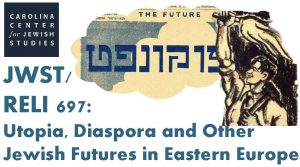 RELI 697: Capstone Course: Themes and Methodologies in Jewish Studies
RELI 697: Capstone Course: Themes and Methodologies in Jewish Studies
Utopia, Diaspora and Other Jewish Futures in Eastern Europe
Concentrating on a different theme each year, this departmental seminar introduces the different areas and approaches in religious studies. Required of majors in religious studies with a concentration in Jewish studies and graduate students pursuing the certificate in Jewish studies.
This course explores visions of Eastern Europe as a potential or realized home for the Jewish people. Rather than repeat the story of Jewish emigration from Eastern Europe, we will investigate scenarios of Jewish presence and return. Course materials drawing from art, literature, and film tour us through Jewish futures imagined in the past and present by anarchists, Marxists, dissidents, and artists. We will reflect on the Jewish concept of tikkun olam (the repairing of the world) by exploring Jewish participation in social transformations of the twentieth century. We will then turn to the Yiddish cultural revival today and contemporary Jewish culture that invokes traditions of twentieth-century Jewish thought. Films with English subtitles; readings and discussions in English.
Eliza Rose, Tuesday and Thursday, 12.30-1.45 pm
Language Courses
HEBR/JWST 101: Elementary Modern Hebrew I.
Introduces the essential elements of modern Hebrew structure and vocabulary and aspects of modern Israeli culture. Aural comprehension, reading, speaking, and writing are stressed.
Hanna Sprintzik, Monday, Wednesday, Friday, 9.05-9.55 am
HEBR/JWST 203: Intermediate Modern Hebrew I.
Prerequisite, HEBR 102. Second-year level instruction in the essential elements of modern Hebrew structure and vocabulary and aspects of modern Israeli culture. Aural comprehension, reading, speaking, and writing are stressed. An introduction to representative literary works is included.
Hanna Sprintzik, Monday, Wednesday, Friday, 10.10-11 am
RELI/JWST 211: Classical Hebrew I: A Linguistic Introduction to the Hebrew Bible.
An introduction to the culture and history of ancient Israel through an exploration of the language of the Hebrew Bible. Students will learn the essentials for basic engagement with biblical Hebrew, then consider what this linguistic evidence reveals about the historical and cultural background of the Hebrew Bible.
Joseph Lam, Monday, Wednesday, Friday, 10.10-11 am
Spring 2021 JWST Course List
JWST 390: Topics in Jewish Studies: Confronting Antisemitism This course takes a broad look at antisemitism in history, our contemporary world, and at UNC. Class sessions will feature guest speakers and discussions on different aspects of this persistent form of hatred. The following questions are key to this course: How has antisemitism evolved over time? How has it remained the same? What are the intersections between antisemitism and other forms of racism? What tools can be used to fight antisemitism?
Max Lazar, TBD
ASIA/JWST 60: Israeli Culture and Society: Collective Memories and Fragmented Identities. First-year Seminar. The course explores selected themes and case studies pertinent to culture and society in modern Israel, with emphasis on debates about “Israeliness” in various cultural and social arenas.
Yaron Shemer, Tuesday and Thursday, 11am -12:15 pm
GERM 56: Germans, Jews, Antisemitism. First-year Seminar. This course seeks to explore the historically difficult position of minorities in the modern world, using the situation of Jews in Germany from the 18th century to the Holocaust as a case study. Students in this seminar will learn to analyze a variety of texts (both literary and philosophical), musical works, and films in relation to the history of Jews in German-speaking countries, and will be able to apply their knowledge to their analysis of present-day manifestations of anti-semitism and xenophobia in Germany. The course has no requisites and presumes no prior knowledge of the subject matter.
Adi Nester, Monday and Wednesday, 3:35-4:50 pm.
RELI 109: History and Culture of Ancient Israel. An examination extending from Hebrew origins to the Babylonian exile and including political history as well as social and religious institutions. This course provides an introduction to the history and culture of ancient Israel from its origins in the Late Bronze Age (approx. 1550–1200 BCE) through the Persian period (539–332 BCE). By synthesizing material from the Bible, other ancient texts, and archaeology, we will come to appreciate the historical forces that shaped ancient Israel and arrive at a framework for a more intelligent and critical reading of the biblical text. The course will also explore themes that are especially relevant to an understanding of ancient Israelite society, including the role of women, social and political structures, and the practices of ancient Israelite religion. Honors version available.
Joseph Lam, Monday and Wednesday, 10:10-11 am.
JWST/RELI/CLAR 110: The Archaeology of Palestine in the New Testament Period. This course surveys the archaeology of Palestine (modern Israel and Jordan) from the Persian period (ca. 586 BCE) to the Muslim conquest (640 CE). The slide-illustrated lectures introduce students to the relevant historical background, the major archaeological sites, and the material culture (pottery, coins, etc). The topics we cover include Qumran and the Dead Sea Scrolls, Herod’s fortress at Masada, ancient Jerusalem, and the development of ancient synagogues and churches. Special attention is devoted to the time of King Herod the Great and the world of Jesus.
Jodi Magness, Tuesday and Thursday, 8-9:15 am
JWST/HIST 153: From the Bible to Broadway: Jewish History to Modern Times. This class surveys the history of the Jews from ancient to modern times. It focuses on the development of Jewish religion, culture identity, and politics in Jewish communities in the Western, Atlantic and Middle Eastern Worlds. It also explores the development of antisemitism and anti-Jewish violence.
Max Lazar, Monday, Wednesday, Friday, 2:30-3:20 pm
JWST/RELI 201: Ancient Biblical Interpretation. This course looks at the origins of biblical interpretation, how the Hebrew Bible was interpreted around the turn of the Common Era, the key formative period for early Christianity and rabbinic Judaism. We consider the nature of interpretation as an endeavor, as well as how the Bible came to be viewed as Scripture. Honors version available.
David Lambert, Tuesday and Thursday, 2-3:15 pm
JWST/GSLL 225-001: Popular and Pious: Early Modern Jewish Literature. This seminar covers popular and pious literature written by and for Jews in the 15th to 18th century in German-speaking countries. Originally written in Old Yiddish, this literature preserved the popular European genres and nonfiction accounts of Jewish community and family life. This literature preserves genres popular in medieval Europe including chivalric romances, fables, and merry tales, together with early examples of Jewish journalism and autobiography. The course will exam a wide variety of texts in translation to illuminate Jewish life in the context of surrounding Christian cultures.
Ruth von Bernuth, Tuesday and Thursday, 3:30-4:45 pm
ASIA/JWST/PWAD 235: Israeli Cinema: Gender, Nation, and Ethnicity. This course is designed for students of Middle Eastern Studies, Jewish and Hebrew Studies, Communications, Women’s Studies, Global Cinema, and for all students interested in learning about Israeli culture and society as represented in cinema. The class will explore the modes of expression by which contemporary Israeli films often depict a multifaceted and conflicted nascent society.
Yaron Shemer, Tuesday and Thursday, 2-3:15 pm
RELI 270: Religion in Western Europe. In this course, we will explore various topics related to the past and present status of religion in general, and of certain religions in particular, within three Western European countries: the United Kingdom, France, an Germany. After investigating key historical moments in the history of religion in these countries, we will explore the present situation. Some parts of the course will be devoted to one country, while others will compare a certain topic in all three. By the end of this course, students will have a good grasp of religion’s place in, and impact on, these three European countries, in the past and the present.
Evyatar Marienberg, Tuesday and Thursday, 11am-12:15 pm
HIST/EURO 347: Fascist Challenge in Europe, 1918-1945. The course focus on theories on fascism, national cultures of fascism (e.g. Nazi Germany, Fascist Italy, Hungary) as well as selected topics which are essential to understand the attraction and functioning of fascist movements and regimes since 1918 in Europe (e.g. racism, war, culture, charismatic leadership).
Kenneth Negy, Monday, Wednesday and Friday, 12:20-1:10pm
FOLK/JWST 380: Traditions in Transition: Jewish Folklore and Ethnography. This seminar examines Jewish stories, humor, ritual, custom, belief, architecture, dress, and food as forms of creative expression that have complex relationships to Jewish experience, representation, identity, memory, and tradition. What makes these forms of folklore Jewish, how do source communities interpret them, and how do ethnographers document them?
Gabrielle Berlinger, Tuesday and Thursday 9:30-10:45 am
HIST 398: Undergraduate Seminar in History. Nazi Germany: A View from the Sources.
Permission of the department. The course is in general limited to 15 students. The subject matter will vary with the instructor. Each course will concern itself with a study in depth of some historical problem. Students will write a substantial research paper.
Konrad Jarausch, Monday, 2:30-5 pm
JWST 465: Literature of Atrocity: The Gulag and the Holocaust in the Soviet Union and Eastern Europe. Historical contexts and connections through artistic representation of the Holocaust and Soviet terror in Eastern Europe and the USSR.
David Pike, Tuesday and Thursday, 3:30-4:45 pm.
RELI/JWST/CLAR 512: Ancient Synagogues. This is a course on ancient synagogues in Palestine and the Diaspora from the Second Temple period to the seventh century CE. Prerequisites: For undergraduates: RELI/JWST 103 or RELI/JWST 106 or RELI/JWST/CLAR 110; undergraduates must be juniors or seniors majoring or minoring in Religious Studies, Jewish Studies, or Classical Archaeology; or graduate standing.
Jodi Magness, Tuesday, 2-4:50 pm
Graduate Courses
GERM 740S: East/West/Zion: German Jewish Modernism. A graduate course about Jewish literary writing in the first half of the 20th century. Topics include space and place, tradition and modernity, identity and belonging, language, nationality, religious practice, and politics. Special focus on the role of Eastern Europe in the literary imagination of German-Jewish writers, and the use of modernist form and style. Class discussions in English; readings mostly in German, with some additional texts in Polish, Russian, Yiddish, and Hebrew. Most texts available in English. Class offered by Duke-UNC.
Kata Gellen (Duke), TBD
RELI 801: Seminar in Biblical Studies: History of the Self. In this graduate seminar, we will examine a range of literature related to the history of the self, from more theoretical works to specific texts in the history of Judaism and Christianity that shed light on changing conceptions of the individual, agency, emotion, and cognition. The goal will be to move beyond common dichotomies between flesh and spirit, body and mind, to arrive at more embodied, situated, and interactive modes of describing the functioning of the person as represented in ancient literature. The focus will be on biblical and ancient Jewish texts, but students from a variety of different fields are welcome to join, bring their expertise to bear on the topic, and focus on research in their respective areas.
David Lambert, Thursday, 4-6:50 pm
Language Courses
JWST/RELI 212 Classical Hebrew II: A Linguistic Introduction to the Hebrew Bible. Prerequisite, RELI 211. This course explores the linguistic background of the Hebrew Bible, giving special attention to the literary aspect of biblical interpretation. Specific topics include the forms of the Hebrew verb, prose and poetic genres in the Hebrew Bible, wordplay and repetition, narration and dialogue. Building on the foundation of RELI /JWST211, this course further explores the linguistic background of the Hebrew Bible, with particular focus on the literary aspect of biblical interpretation. We wil consider what it means for the Bible to be a “literary” text, and explore the implications of this claim for our understanding of the Bible in view of its original historical-cultural settings. At the same time, students will deepen their knowledge of Classical Hebrew grammar through an overview of the verbal system, with emphasis on verbal forms, constructions, and sequences that have direct bearing on literary interpretation. The course will include a term paper that provides students the opportunity to present a synthetic interpretation (historical, cultural, literary, and linguistic) of a passage from the Hebrew Bible.
Joseph Lam, Tuesday and Thursday, 11 am-12:15 pm
JWST/HEBR 102 Elementary Modern Hebrew II. Prerequisite, HEBR 101. Continued instruction in the essential elements of modern Hebrew structure and vocabulary and aspects of modern Israeli culture. Aural comprehension, reading, speaking, and writing are stressed.
Hanna Sprintzik, Monday, Wednesday, and Friday, 9:05-9:50 am
JWST/ HEBR 204 Intermediate Modern Hebrew II. Prerequisite, HEBR 203. Continued instruction in the essential elements of modern Hebrew structure and vocabulary and aspects of modern Israeli culture. Aural comprehension, reading, speaking, and writing are stressed. An introduction to representative literary works is included.
Hanna Sprintzik, Monday, Wednesday, and Friday, 10:10-11 am
JWST/HEBR 306 Advanced Composition and Conversation: Zionism and the Hebrew Language Advanced Modern Hebrew II. Prerequisite, HEBR 204 305. Third year of instruction in modern Hebrew with an emphasis on Israeli culture, literature, and media.
Hanna Sprintzik, Monday, Wednesday, and Friday, 12:20-1:10 pm
Fall 2020 JWST Course List
RELI 063: First Year Seminar: Dead Sea Scrolls | Jodi Magness
JWST 106/ RELI 106: Introduction to Early Judaism | HS/BN/WB |Jodi Magness
RELI 108: Classic Jewish Texts: From Bible and Dead Sea Scrolls to Kabbalah and Hassidism | HS/WB | Evyatar Marienberg
JWST/ RELI 343: Religion in Modern Israel | Yaakov Ariel
JWST 480: Jewish Belongings: Material Culture of the Jewish Experience | EE/US/VP | Gabrielle Berlinger
RELI 542H: Religion and Counter Culture | Yaakov Ariel
JWST 697: Capstone Course: Themes and Methodologies in Jewish Studies. CI | Andrea Cooper
Language Courses
HEBR 101: Elementary Modern Hebrew I. FL | Ana Sprintzik
HEBR 102: Elementary Modern Hebrew II. FL | Ana Sprintzik
JWST 211/ RELI 211: Classical Hebrew I: A Linguistic Introduction to the Hebrew Bible. BN/ WB | Joseph Lam
Maymester 2020
Jwst/ASIA/PWAD 235 Israeli Cinema VP/BN/GL | Yaron Shemer
Jewish Studies Courses for Spring 2020
JWST 390: Topics in Jewish Studies: Confronting Antisemitism
This course takes a broad look at antisemitism in history, our contemporary world, and at UNC. Class sessions will feature guest speakers and discussions on different aspects of this persistent form of hatred. The following questions are key to this course: How has antisemitism evolved over time? How has it remained the same? What are the intersections between antisemitism and other forms of racism? What tools can be used to fight antisemitism?
RELI 078: Reading the Bible: Now and Then
RELI 108: Classic Jewish Texts: From Bible and Dead Sea Scrolls to Kabbalah and Hassidism
RELI 109: History and Culture of Ancient Israel
JWST/RELI/CLAR 110: The Archaeology of Palestine in the New Testament Period
JWST/HIST 153: Jewish History Ancient to Modern Times
JWST/HIST/PWAD 262: History of the Holocaust: The Destruction of the European Jews
JWST/ RELI 343: Religion, Politics and Culture in Israel
JWST/ASIA 357/ PWAD 362: The Arab-Jews: Culture, Community, and Coexistence
ASIA 358: Religion and Tradition in Israeli Cinema, TV and Literature
JWST/ FOLK 380: Traditions in Transition: Jewish Folklore and Ethnography
RELI 426H: The Sacrifice of Abraham
JWST/GSLL/PWAD 465: Literature of Atrocity: The Gulag and the Holocaust in the Soviet Union and Eastern Europe
JWST/ RUSS 480H: Russian-Soviet Jewish Culture: Lofty Dreams and Stark Realities
JWST/ HIST 485: Modern East European Jewish History
RELI 501: History of the Bible in Modern Study
Language Courses
HEBR 102: Elementary Modern Hebrew II
JWST/ RELI 212: Classical Hebrew II: A Linguistic Introduction to the Hebrew Bible
HEBR 204: Intermediate Modern Hebrew II
HEBR 305: Advanced Modern Hebrew I
Jewish Studies Courses for Fall 2019
RELI 123/JWST 100: Introduction to Jewish Studies
RELI/JWST 103: Intro to Hebrew Bible
RELI/JWST 106: Introduction to Early Judaism
RELI/JWST 211: Classical Hebrew I: A Linguistic Introduction to the Hebrew Bible
RELI/JWST 420H: Post-Holocaust Ethics and Theology
RELI/JWST 712: Jewish Hist/Lit
JWST 697: Capstone Course: Themes and Methodologies in Jewish Studies: Sounding “Jewish”: Music, Race, Memory
HIST332: Jewish Identity and Community
Language Courses:
HEBR 101: Elementary Modern Hebrew
HEBR203: Intermediate Modern Hebrew
Jewish Studies Courses for Spring 2019
RELI/CLAR/JWST 110: New Testament Archaeology
JWST/GSLL/PWAD 465: Atrocity
JWST/HIST 153: Jewish Hist Ancient to Modern
JWST/HIST/PWAD 262: History of the Holocaust
JWST/HIST 311/311H: Ghettos and Shtetls?
JWST/HIST 330: Jesus and Jews
JWST/ASIA /PWAD 235: Israeli Cinema: Nation, Gender and Ethnicity
JWST100/RELI 123: Intro to Jewish studies
JWST/HIST 330/330H: Jesus and the Jews
JWST/GSLL/PWAD 465: Lit of Atrocity
RELI/JWST 503/503H: Exploring the Dead Sea Scrolls
JWST/RELI 602: What is Scripture?
RELI 426H: The Sacrifice of Abraham
HIST/ASIA 276: Modern Middle East
Language Courses
HEBR 102: Elementary Modern Hebrew II
HEBR 204: Intermediate Modern Hebrew II
HEBR 306: Adv modern Hebrew II
Jewish Studies Courses for Fall 2018
Undergraduate Courses:
FOLK 481: The Changing Lives of Jewish Objects
RELI 063: Archaeology of Qumran
JWST/RELI 103: Introduction to the Hebrew Bible/Old Testament Literature
JWST/RELI 106: Introduction to Early Judaism
JWST/ASIA/PWAD 235: Israeli Cinema: Gender, Nation, Ethnicity
JWST/RELI 420H: Post-Holocaust Ethics and Theology
JWST/RELI 444: Gender and Sexuality in Contemporary Judaism
JWST 697: Capstone Course: Yiddish Literature and the Bible
MUSC 286: Music as Culture: Music, Sound, and Religion in the Middle East and North Africa
Language Courses:
HEBR 101: Elementary Modern Hebrew I
HEBR 203: Intermediate Modern Hebrew I
HEBR 305: Advanced Modern Hebrew I
COURSES IN JEWISH STUDIES Spring 2018
JWST 100/RELI 123: Intro to Jewish Studies, Andrea Cooper
JWST/CLAR/RELI 110: New Testament Archaeology, Jodi Magness
JWST/HIST 262: History of the Holocaust, Karen Auerbach
JWST 357/ASIA 357/PWAD 362: The Arab-Jews: Culture, Community, and Co-existence
JWST/HEBR 436: Zionism and Language, Yaron Shemer
JWST/SLAV/PWAD 465: Literature of Atrocity, David Pike
JWST/FOLK 505: Jewish Folklore and Ethnography, Gabrielle Berlinger
JWST/HIST 330H: Jesus and the Jews, Flora Cassen
HIST 85H: Concentration Camp Survivors, Donald Reid
HIST 276: Modern Middle East, Sarah Shields
HIST 308: The Renaissance and the Jews, Flora Cassen
HIST 485: Modern East European Jewish History, Karen Auerbach
RELI 106: Early Judaism, Online through Friday Center
RELI 242: New Religious Movements, Yaakov Ariel.
RELI 542H: Religion and Counter Culture, Yaakov Ariel.
Language Courses:
HEBR 102: Elementary Modern Hebrew II, Hanna Sprintzik
HEBR 102: Elementary Modern Hebrew II, Hanna Sprintzik
HEBR 204: Intermediate Modern Hebrew II, Hanna Sprintzik
Graduate Courses:
RELI 812: Diaspora Judaism | Jodi Magness.
